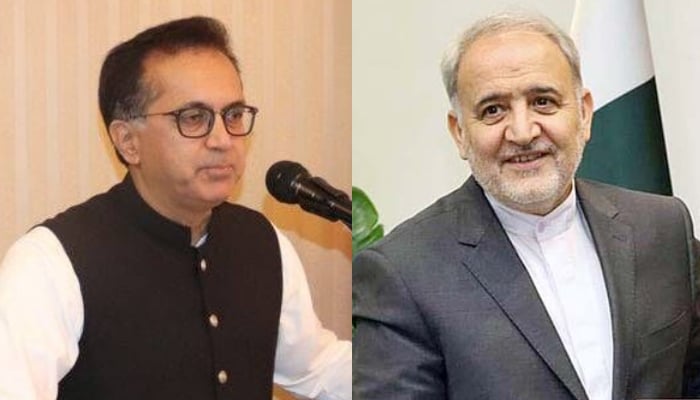'New chapter': Envoys return to duties after brief Pakistan-Iran tense ties
Pakistan and Iran normalise ties as envoys back to their posts in Tehran and Islamabad respectively, says FO spox
The diplomatic ties between Pakistan and Iran move towards normalisation as the envoys from the two neighbouring countries returned to their posts in Tehran and Islamabad, respectively, Foreign Office (FO) Spokesperson Mumtaz Zahra Baloch said on Friday.
The diplomats are set to resume their duties following a brief strain in ties due to cross-border tensions that arose last week after an unprovoked drone attack by Iran in Balochistan claiming to target a militant outfit on January 16.
Pakistan's Ambassador to Iran Muhammad Muddasir Tipu returned to Pakistan, briefly halting the diplomatic relations with the neighbouring country after a surprise attack, while the Iranian ambassador to Pakistan had already left for Iran.
However, the FO spokesperson announced today that the Pakistani ambassador had arrived in Tehran and his Iranian counterpart in Islamabad as per mutual understanding between the two countries.
Later, Amb Mudassir also confirmed his arrival in Tehran, saying the envoys' returns would open a "new chapter" to consolidate bilateral ties.
As the neighbouring countries try to bring their relations back to normalcy in the wake of a short but aggressive episode of cross-border tensions, Amb Mudassir earlier in the day announced his return to Tehran via an X — formerly Twitter, post.
Earlier this week, the two countries mutually agreed that their ambassadors would return to their respective posts by January 26, 2024.
In a joint statement issued on Monday, the Foreign Office said that at the invitation of Foreign Minister Jalil Abbas Jilani, his Iranian counterpart Hossein Amir Abdollahian will undertake a visit to Pakistan on January 29.
Taking to X, formerly Twitter, Ambassador Mudassir said he is en route to return to the Iranian capital in "conformity with the sincere and good wishes of Pakistan’s leadership".
"Ever more determined to work for a more robust, stronger & peace-loving [Pakistan]," added Tipu, who returned to Islamabad on January 17 following the attack by Iran.
Commenting on the significance of a peaceful relationship between Islamabad and Tehran, Ambassador Mudassir further stated that a strong Pakistan and Iran are "critical for region & to promote historic people to people ties".
"Time to turn a new leaf," he wrote in his post on X.
In response to Iran's attack, termed "unprovoked" by the Foreign Office, the Pakistani military targeted terrorist hideouts inside the Iranian border a day and a half later on January 18.
Pakistan's retaliation killed several terrorists during the intelligence-based operation — codenamed "Marg Bar Sarmachar" by the military.
Iran's attack, on the other hand, left two children dead and injured three girls, stating that it violated the country’s sovereignty.
Pakistan, on January 17, also withdrew its ambassador from Iran and announced that it would not allow the Iranian envoy visiting his home country at that time to return to protest at a "blatant breach" of its sovereignty after Tehran said it launched missile attacks on militant bases in southwestern Pakistan.
-
Security forces gun down 30 terrorists in multiple IBOs in KP: ISPR
-
MQM-P calls for new province in Sindh
-
US report validates Pakistan military edge over India: PM
-
Banned TTP poses serious threat to Pakistan security: UNSC panel
-
CM Afridi clarifies remarks on by-poll after ECP requests army deployment
-
Dubai sees 3.2m Pakistani passengers in 2025 as airport sets new milestone
-
Security forces kill 23 Indian proxy terrorists in KP's Kurram
-
Pakistan to construct island to boost oil exploration: report












